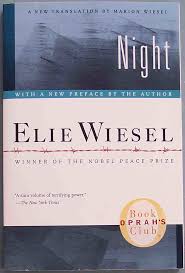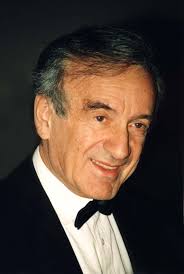Night Page #11
"Night" is a work by Elie Wiesel about his experience with his father in the Nazi German concentration camps at Auschwitz and Buchenwald in 1944–1945, at the height of the Holocaust toward the end of the Second World War. In just over 100 pages of sparse and fragmented narrative, Wiesel writes about the death of God and his own increasing disgust with humanity, reflected in the inversion of the parent–child relationship, as his father declines to a helpless state and Wiesel becomes his resentful teenage caregiver. "If only I could get rid of this dead weight ... Immediately I felt ashamed of myself, ashamed forever." In Night everything is inverted, every value destroyed. "Here there are no fathers, no brothers, no friends", a kapo tells him. "Everyone lives and dies for himself alone." Wiesel was 16 when Buchenwald was liberated by the United States Army in April 1945, too late for his father, who died after a beating while Wiesel lay silently
"What are you going to do, sir?" "I shall remove your gold crown, that's all," he said, clearly indifferent. I thought of pretending to be sick: "Couldn't you wait a few days, sir? I don't feel well, I have a fever..." He wrinkled his brow, thought for a moment, and took my pulse. "All right, son. Come back to see me when you feel better. But don't wait for me to call you!" I went back to see him a week later. With the same excuse: I still was not feeling better. He did not seem surprised, and I don't know whether he believed me. Yet he most likely was pleased that I had come back on my own, as I had promised. He granted me a further delay. A few days after my visit, the dentist's office was shut down. He had been thrown into prison and was about to be hanged. It appeared that he had been dealing in the prisoners' gold teeth for his own benefit. I felt no pity for him. In fact, I was pleased with what was happening to him: my gold crown was safe. It could be useful to me one day, to buy something, some bread or even time to live. At that moment in time, all that mattered to me was my daily bowl of soup, my crust of stale bread. The bread, the soup— those were my entire life. I was nothing but a body. Perhaps even less: a famished stomach. The stomach alone was measuring time. IN THE WAREHOUSE, I often worked next to a young Frenchwoman. We did not speak: she did not know German and I did not understand French. I thought she looked Jewish, though she passed for "Aryan." She was a forced labor inmate.
Translation
Translate and read this book in other languages:
Select another language:
- - Select -
- 简体中文 (Chinese - Simplified)
- 繁體中文 (Chinese - Traditional)
- Español (Spanish)
- Esperanto (Esperanto)
- 日本語 (Japanese)
- Português (Portuguese)
- Deutsch (German)
- العربية (Arabic)
- Français (French)
- Русский (Russian)
- ಕನ್ನಡ (Kannada)
- 한국어 (Korean)
- עברית (Hebrew)
- Gaeilge (Irish)
- Українська (Ukrainian)
- اردو (Urdu)
- Magyar (Hungarian)
- मानक हिन्दी (Hindi)
- Indonesia (Indonesian)
- Italiano (Italian)
- தமிழ் (Tamil)
- Türkçe (Turkish)
- తెలుగు (Telugu)
- ภาษาไทย (Thai)
- Tiếng Việt (Vietnamese)
- Čeština (Czech)
- Polski (Polish)
- Bahasa Indonesia (Indonesian)
- Românește (Romanian)
- Nederlands (Dutch)
- Ελληνικά (Greek)
- Latinum (Latin)
- Svenska (Swedish)
- Dansk (Danish)
- Suomi (Finnish)
- فارسی (Persian)
- ייִדיש (Yiddish)
- հայերեն (Armenian)
- Norsk (Norwegian)
- English (English)
Citation
Use the citation below to add this book to your bibliography:
Style:MLAChicagoAPA
"Night Books." Literature.com. STANDS4 LLC, 2024. Web. 23 Dec. 2024. <https://www.literature.com/book/night_336>.




Discuss this Night book with the community:
Report Comment
We're doing our best to make sure our content is useful, accurate and safe.
If by any chance you spot an inappropriate comment while navigating through our website please use this form to let us know, and we'll take care of it shortly.
Attachment
You need to be logged in to favorite.
Log In